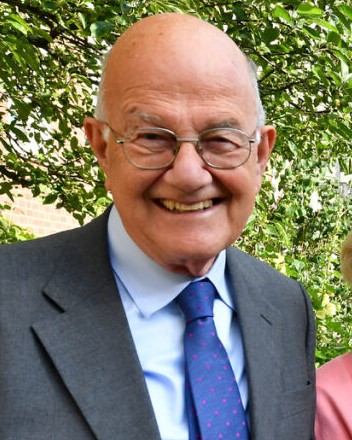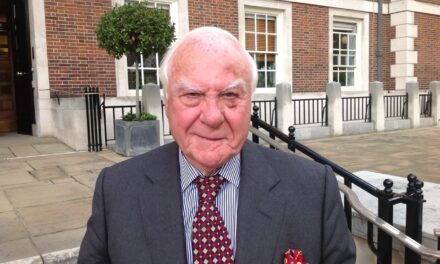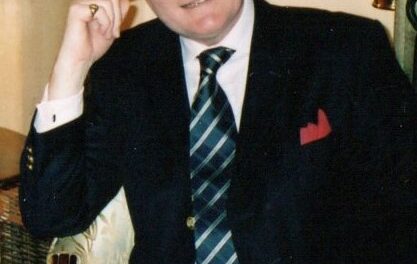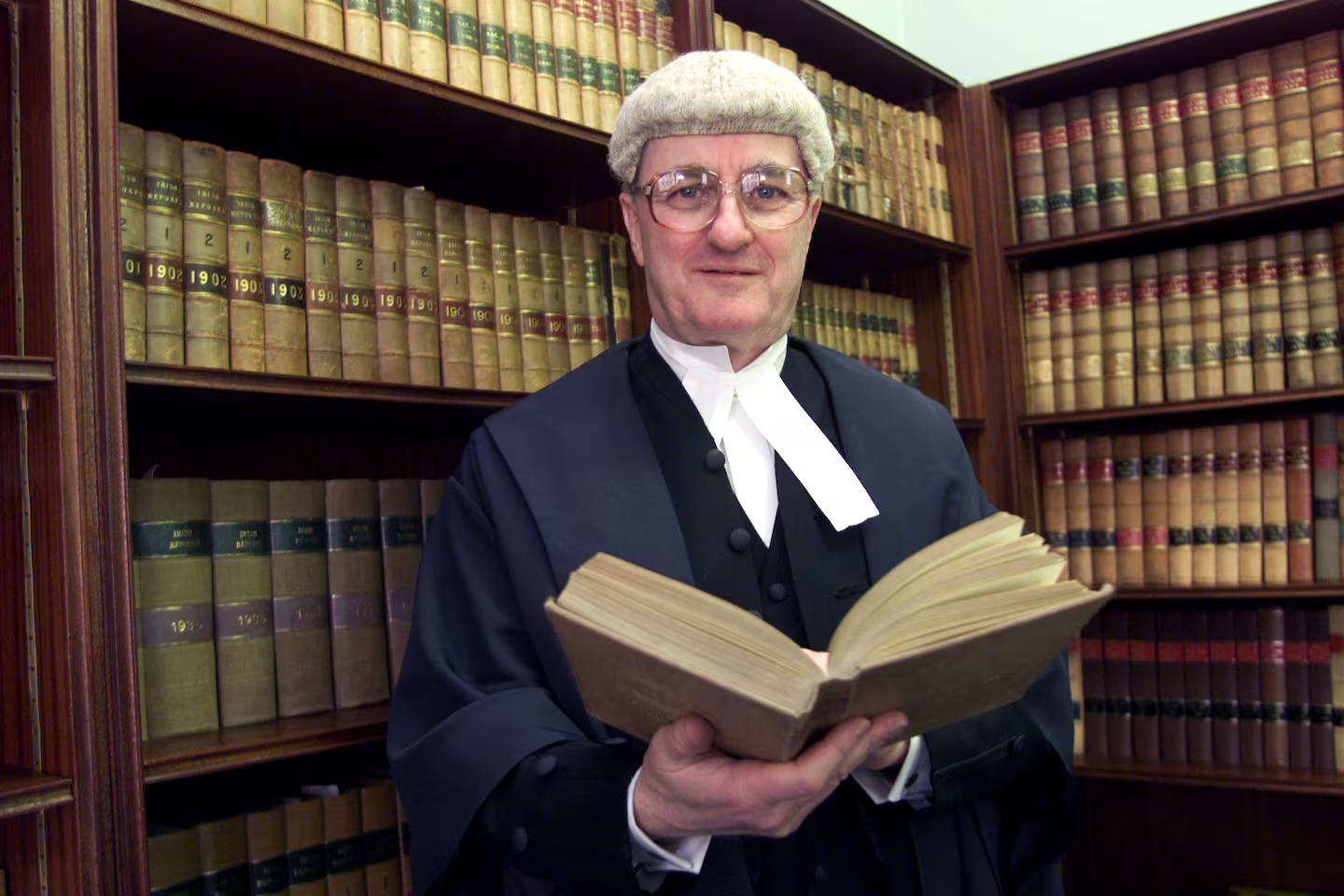
Tribute at Master Igor Judge’s Memorial Service – Thursday 25 January 2024
We are here this evening to celebrate the life of a man whose personal, moral, and intellectual qualities were remarkable, whose contributions to the governance of this country, and to the rule of law in particular, were exceptional, who brightened the lives of those with whom he lived and worked, and who was loved and respected by everyone who was associated with him.
It is a great honour to have been asked to give the tribute this evening to Igor Judge, but it is also a great challenge to do that wonderful man the justice which he deserves.
Igor was born in Malta during an intense German bombing raid during the 18-month siege – and, as a lover of history, he would remind you that it was the second terrible (and, he would proudly add, unsuccessful) siege of Malta.
Igor’s English father’s surname was of course Judge; but, perhaps less well known is the fact that his Maltese mother’s maiden name was Micaleff, which means judge in Arabic. And so, as Igor used to say, he had very little choice when in due course it came to selecting his profession.
Having started off life on what was then a starving rubble-ridden Mediterranean island, Igor had a happy time at school in England, where his academic success was, at least in his eyes, dwarfed by his achievement in captaining his school cricket team at Lord’s.
From school he went on to Cambridge, where he learned a lot, and he subsequently wrote movingly about some of his tutors. He then read for the Bar, and became a member of Middle Temple, for which he maintained a fierce loyalty and affection, later describing its ‘story [as] vivid and remarkable [and] interleaved with the history of England and nations beyond the seas.’
In 1963, he joined chambers at 2 Crown Office Row, a powerful Midland Circuit set, and now 7BR. Igor always cherished his Midland Circuit connection. When, swearing in new judges as Lord Chief Justice, he would refer affectionately to his time as ‘a Midland Circuit hack.’ He was of course as far from being a hack as it was possible to be. His opponents remember him as being charming and very easy to deal with out of court, but a lethal advocate in court, combining an acute knowledge of the law, a commanding grasp of the facts, and a great understanding of people. John Goldring described him as ‘a devastatingly effective jury advocate, [who] could speak their language … [and] when he addressed a jury, it was as if he was sitting with them in the jury box, chatting in a homely manner, his humanity [shining] through.’
He inspired devotion in his pupils. One of them recalls Igor saying that, following a day in court, one was entitled to congratulate oneself or wallow in despair, depending on how the day had gone, but the congratulations or despair had to end the moment one arrived back at chambers. For it to continue would be self-indulgent and would take one’s mind off the next day or the next case, to the detriment of the client. Another pupil’s recollection is of Igor’s execrable handwriting, which meant that ‘the instruction to take his notebook home and extract the important evidence for his leader to consider the following day was the stuff of nightmares.’
In 1988, Igor became a High Court Judge sitting in what was then the Queen’s Bench Division. Lord Hendy recalls that he was ‘a wonderful judge: courteous, charming, attentive, concise and, of course, just.’
Appropriately for someone committed to a first-class judiciary, almost at the inception of the Judicial Studies Board, now the Judicial College, Igor ran a course for new judges. In his welcome, he described the ‘essential judicial qualities’ as ‘patience, fortitude, determination, and… the courage to do what you believe to be right… while recognising that as a human being you are bound to be fallible, but as a judge you are required to provide an answer rather than leave the parties in uncertainty.’
Igor was promoted to the Court of Appeal in 1996. Four years later, he was appointed Senior Presiding Judge, and in 2005, he became President of the Queen’s Bench Division. To sit with Igor when he was presiding in the Court of Appeal was to attend a masterclass in judging. Like an outstanding schoolteacher with pupils, he managed to get the best out of advocates, not by being stern or challenging, but by inspiring such a sense of respect that they didn’t want to disappoint him. He managed to stamp his personality and authority on every hearing without raising his voice, talking much or pulling rank. And he treated his two judicial colleagues as his equals while at the same time making it clear that he was in charge.
He worked hard but he never showed off that he had done his homework, either in court or out of court. His judgments were concise and clear. He rightly deprecated the growing practice of long judgments setting out and quoting from every conceivable authority on the topic, often mentioning one of his teachers at school, who reprovingly marked essays ‘APK’ – anxious parade of knowledge.
He didn’t only work hard in court. He also kept fit by going to a local swimming pool before coming to the Royal Courts of Justice. One morning, when drying off after a swim, he started chatting to a young man, and asked him what he was doing that day. The young man said that he was a barrister and added ‘I’ve an awful day ahead. I’ve got to face those buggers in the Court of Appeal. And what about you?’ Igor’s reply was: ‘I’m one of those buggers.’
In 2008, a competition for the Lord Chief Justice was announced, and Igor applied. In fact, it wasn’t a competition, because he was so obviously the right person that nobody stood against him. If the choice had been up to the judges, he would have got the job by universal acclamation. It wasn’t up to the judges, but he nonetheless got the job by universal accord.
As Lord Chief, he gave a number of important judgments and did not shy away from the difficult cases. A few examples must suffice. He led a ‘sea change’ in the approach to cross examining vulnerable witnesses, he upheld sentences on MPs in the expenses scandal, he quashed an acquittal for the murder of Stephen Lawrence to allow for a retrial, he overturned the Hillsborough inquest verdict and ordered a fresh inquest, he imposed a sensible limit on the use of criminal charges under the Communications Act 2003 for online jokes, and he gave a key decision on trafficking and abuse.
In his five years as Lord Chief, Igor achieved much more than important judgments. He took up the office after a turbulent decade which had seen ill-considered constitutional reforms, an undermining of judges’ status, and an attack on their pension arrangements. As a result, morale across the judicial spectrum was at a low ebb, which is not only bad in itself but can undermine the administration of justice and recruitment to the bench. With his warmth of character, sense of humour, communication skills, and commitment to an independent judiciary, Igor’s speeches and his talks with the judges at all levels helped to ensure that judicial morale was restored with remarkable speed. Very few judges are universally respected and admired by their colleagues; Igor was not only respected and admired, but also loved, by his colleagues.
Of the various ill-considered constitutional changes, Igor particularly deprecated the abolition of the traditional office of the Lord Chancellor, who was a senior respected lawyer with their own department who fearlessly spoke up in cabinet and in public for the rule of law, as a grave mistake. Nonetheless, true to form, he accepted the new system and worked his magic on a Lord Chancellor who viewed the judges as a vaguely hostile alien species, and who did not so much have a different idea of constitutional propriety, as no idea of constitutional propriety.
Igor’s time as Lord Chief ended with the judiciary’s reputation considerably enhanced and its independence respected, both in government circles and much more widely. This was not only as a result of what Igor said, it also resulted from what he did. He promoted regular, informal meetings between senior judges and Parliamentarians, so that members of the judiciary and members of the legislature could discuss and understand each other’s priorities, concerns and constitutional perceptions.
Igor also saw that the relationship between the judiciary and the media, which had varied between mutual incomprehension and outright hostility, needed to be improved. Accordingly, he arranged informal dinners between senior judges and national newspaper editors. He thereby established a significant degree of mutual respect and understanding between the two institutions, although he was under no illusions as to the risks, saying ‘If we are going to sit down and eat with the press, we will have to sup with a long spoon.’
For three years as Master of the Rolls, I was Igor’s number two in the judicial hierarchy and observed at close quarters his uncanny facility of dealing with people of all types in all circumstances. It was not merely that he plainly respected anyone he was talking to and their views. It was also his remarkable ability to disagree without being remotely confrontational. And the combination of his eloquence, well-prepared arguments, winning personality and the respect he commanded made it very hard to disagree with him. As Sir Brian Leveson put it, ‘Nobody said “no” to Igor.’ Occasionally, he asked me which of two courses he should take, and a long silence after my answer would be an indication that he disagreed; to break the silence I would often add that there was something to be said for the other course, a statement with which he at once enthusiastically agreed. But although decisive he was never unreasonable. and he was persuadable… sometimes.
One of the many joys of working with Igor was our discussions on non-legal topics. To be able to tap into his love and knowledge of English history was a particular privilege. For instance, he introduced me to the 15th Century Paston letters and the 16th Century Lisle papers. He lent me his copies, and they were well worth reading, painting a vivid picture of English life during the late Plantagenet and early Tudor times.
After 15 years of successfully occupying leading judicial positions, five of them as Lord Chief, Igor stood down in 2013. Retirement did not mean putting his feet up. Far from it. After a very happy year as Treasurer of Middle Temple, Igor moved seamlessly from being an outstanding leading judge in the Royal Courts of Justice to being an outstanding leading legislator in the House of Lords. It was a natural home for someone so passionate about the rule of law, so committed to our constitution, and so keen on history. His speeches in the Chamber were, as I enviously observed, pitch perfect in terms of content, style and delivery. Igor’s principled assaults on Henry VIII’s clauses and other constitutional affronts were as merciless and effective as Henry VIII’s unprincipled assaults on the monasteries – but far more elegant and civilised.
Igor was so effective, respected, and popular in the House that, in 2019, he was elected convenor of the crossbenchers, a role he held until his ill-health forced him to retire. The tributes from all parts of the House during the two days following his death were extraordinary, both in number and in warmth. Three brief extracts must suffice this evening. Lord True referred to Igor’s ‘words of crystalline clarity, deepest wisdom and great humanity’, which ‘will long be treasured by all of us who heard them in’ the Chamber. Baroness Smith of Basildon described how she ‘greatly valued his advice on constitutional and legal issues’, and how ‘in debate, his mild and gentle use of language could pack one powerful punch.’ And Lord Newby said that Igor ‘could explain the most complex arguments in language that everyone could readily understand’ and was ‘master of asking ministers the unanswerable questions.’
Another post-Chief Justice role was as an active visiting professor at King’s College London, where his assistant subsequently recorded how impressed she was by his ‘refined appreciation of art, aesthetics, music, history and literature, which shaped his legal reasoning and the uncanny precision and beauty of his language – which was never dry, never dismissive, never self-indulgent, and always to the point.’
This observation captures the fact that Igor really was a man of deep and informed interests, with his love of history (English), law (common), horticulture (planting), reading (everything), music (classical), cricket (Middlesex) and football (Leicester City).
The observation also illustrates how Igor impressed everyone he dealt with, whether judges, peers, people working for him or strangers, because he treated everyone with respect, courtesy and good humour. Everyone I know who worked for him – in the Royal Courts, in the House of Lords, in the Middle Temple – has said what a good, kind and thoughtful person he was to work for. Unprompted, many described him as the best boss they had ever had. As Lord Dyson put it in his valedictory when Igor retired as Chief Justice, ‘He remembers the names of everyone, as well as the names of their partners, their children and their dogs.’
Because of his light touch, humorous asides, and human understanding, even many of his closest colleagues did not appreciate the depth of Igor’s knowledge of English history and of the common law. Over several decades, he assembled a collection of 15th Century manuscripts, which he gave to the Middle Temple in 2015. And his six-year tenure as President of the Selden Society from 2007 was a fitting recognition of his seriousness as a legal historian.
He gave many memorable speeches over the years. 35 of them were published in a book shortly after he retired from the bench. They covered constitutional history, current constitutional issues, administration of justice, judging, and other personal passions. The very first chapter, ‘Magna Carta: Luck or Judgment’ is almost magical to read. Igor’s love of history, commitment to the law, and patriotism percolate all 16pages. With clarity of expression, lightness of touch, and flashes of humour, he vividly explains the background, the personalities, and issues, the combination of high principle and low self-interest, leading up to the sealing of the Great Charter, as well as explaining the aftermath, and describing the influence and role of Magna Carta down the ages. The footnotes, both in quality and quantity – are typical of Igor. There are only six – two are current works of serious academic scholarship, two are 17th or 18th Century pamphlets, and the remaining two are Hilary Mantel’s Wolf Hall and 1066 and All That. He explains that the paucity of footnotes is attributable to his desire to avoid an anxious parade of knowledge. The next chapter is also well worth reading; it is about one of Igor’s heroes, who played a vital part in many 12th and 13th Century events including Magna Carta, William Marshal, whom he describes as ‘one of the forgotten men of history.’
There could be no more fitting place to celebrate Igor’s life than in this building, the church of his beloved Middle Temple, which is, as he put it, the ‘Mother Church of the Common Law, where the Master of the Temple assisted King John and his rebellious barons to thrash out the terms’ of what became Magna Carta. And it has the additional features of having the tomb of John Selden, and, even more relevantly, of William Marshal.
Moving from the past to the present, at least while a judge, Igor was notoriously an IT-free zone. No laptop, no iPad, no texts, no emails, and, for a short time only an iPhone, but its battery was almost always uncharged. Only later did he start using an iPad, although infrequently and he appeared to be unaware of the upper-case function.
His IT aversion was perhaps an aspect of his natural conservatism which was of a characteristically mild and benevolent nature. It was heartening to see how, whenever his conservative instincts were in conflict with his passion for fairness and justice, the outcome was never in doubt. At an otherwise rather dull four-day Commonwealth Lawyers conference in 2013 largely attended by a male and pretty reactionary audience, his speech about the iniquities of inequality and discrimination, focussing on the plight of the Afghan women judges, received two standing ovations and moved many to tears. And he had an excellent record of approaching and encouraging women advocates to become judges.
Igor was delighted by the appointment of the first Lady Chief Justice and having been very pleased and impressed by the performance of his two immediate successors in the role, John Thomas and Ian Burnett, he would have been very pleased and impressed by Sue Carr’s first few months as Chief Justice.
I referred to his book of speeches. Its title was The Safest Shield, which is how Edward Coke (one of Igor’s predecessors as Chief Justice) described the law. In his introduction, Igor recorded his admiration for Coke, but also demonstrated his lightness of touch when he described Coke as ‘not a man always able to resist the temptation to use ten words when five will do.’ So strongly did Igor feel about the rule of law that he might have chosen The Safest Shield as his motto, were it not for something even closer to his heart, which is the motto on his coat of arms and in the book’s dedication, ‘To Judith – Sine Amore Nihil’ (without love there is nothing).
On these occasions it is normal to say very little about the subject’s private life, but no talk about Igor could possibly consign Judith to the sidelines. There was nothing more important to Igor than Judith and their children, Helen, Alastair, and Emma, and in due course the grandchildren. The three photographs in this evening’s Order of Service, which were chosen by Igor, show what a very happy family man he was – the delighted grandfather at his granddaughter’s wedding, the proud father with his three children, the joyful husband relaxing with his beloved wife.
Judith was always with him when he attended public functions, smiling, composed, elegant, solicitous – and excellent company. In his funeral tribute to his father, Alastair said that his parents were ‘mesmerised by each other from their first date’, and you only had to talk to Igor for five minutes to realise how important Judith was to him and how much he loved her. They were completely ad idem on all moral and social issues, but so different in their practical interests, and above all so mutually loving and supportive. Their relationship both exemplified and explained Igor’s often expressed concern to all those who worked with him and for him that they spend time with their families.
Despite his remarkable qualities, Igor would have been the first to agree that he would not have achieved his success at the Bar, on the bench, in the Inn, and in Parliament without Judith. To see them together was always a memorable and uplifting experience.
Igor’s death is a very great blow indeed for all his friends, colleagues, and other admirers, but it is nothing compared with the blow which it must be for Judith and his family. At least for me, and I hope for everyone who knew him, and especially for Judith and his family, the blow is softened by the vivid memories of the stimulating and life-enhancing times we all enjoyed in his company, his uplifting and intelligent speeches and conversation, and his impressive and long-lasting contributions to the common law, the independence of the judiciary, and constitutional propriety.
This country should count itself very lucky indeed if it ever sees Igor Judge’s like again.
David Neuberger
Temple Church
Thursday 25 January 2024




